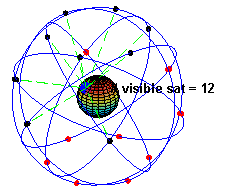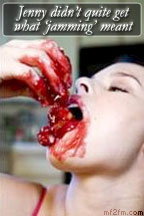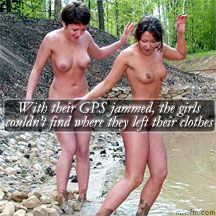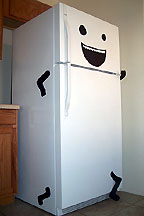 First off, let's get a few things straight. GPS works by using a constellation of about 30 medium earth orbit (MEO) satellites run by the US military which go whizzing around the earth twice every day at a height of 20,000 km to transmit position and time information to receivers on the ground. From this information GPS receivers then can work out where they are. This means that the only person who knows your location is you - there is no path back to the satellite which somehow covertly tells the satellite where you are.
First off, let's get a few things straight. GPS works by using a constellation of about 30 medium earth orbit (MEO) satellites run by the US military which go whizzing around the earth twice every day at a height of 20,000 km to transmit position and time information to receivers on the ground. From this information GPS receivers then can work out where they are. This means that the only person who knows your location is you - there is no path back to the satellite which somehow covertly tells the satellite where you are. Thus GPS devices in themselves can not be used to 'track' the location of users. What they do provide is location information which could then be sent on via some other (radio) connection to enable someones location to be tracked. Standard in-car navigation systems do not have such a facility built in and thus using one does not alert the authorities (or anyone else for that matter) to your location.
That aside, there are in increasing number of uses to which GPS is being put in which the location information it provides is used for control purposes. For example, there are anti-social behaviour tags which monitor the location of offenders and send a signal to the local police or council if the person wearing it goes outside a pre-determined area (or indeed goes inside a particular area).
Similarly, knowing where a vehicle is (for example by sending the GPS location back to a central point via a GSM phone) can be used for road toll or car insurance calculation. There is therefore a growing 'demand' for devices which can stop the GPS receiver working so that the location information for tracking people or cars is not available. Such devices are known as GPS jammers and work in much the same way as the jammers used by various governments to stop international broadcasters.
 The most basic GPS jammers operate by producing a high power signal on the main frequency used by GPS receivers, strong enough to ensure that the GPS receiver can no longer hear the (very weak) signals from the GPS satellites and therefore thinks it has lost them and stops working. However, receiver manufacturers have gotten wise to such wheezes and have managed to find ways to overcome this 'carrier' jamming. More sophisticated jammers closely mimic the GPS signal so that not only is the receiver overwhelmed by the local interference but it becomes far more difficult to overcome the jamming as it looks just like a valid GPS signal.
The most basic GPS jammers operate by producing a high power signal on the main frequency used by GPS receivers, strong enough to ensure that the GPS receiver can no longer hear the (very weak) signals from the GPS satellites and therefore thinks it has lost them and stops working. However, receiver manufacturers have gotten wise to such wheezes and have managed to find ways to overcome this 'carrier' jamming. More sophisticated jammers closely mimic the GPS signal so that not only is the receiver overwhelmed by the local interference but it becomes far more difficult to overcome the jamming as it looks just like a valid GPS signal.The problem, though, with such jammers is that they don't just wipe out GPS reception by the receiver they are intending to interrupt, but can knock out GPS reception over quite a wide area. Even basic, low power devices (which typically use transmitter powers of around 10 milliWatts) can produce signals strong enough to stop GPS receivers working over a range of several hundred metres. More powerful devices (and there are some easy to get hold of devices which put out a Watt or more) can cause problems for GPS receivers over ranges of over a mile. So without knowing it, someone trying to defeat the GPS monitoring device put in their company car to monitor their movements can unintentionally end up causing aircraft or ships to not be able to identify where they are either.
Now, of course, GPS jammers are illegal to use as they intentionally cause interference which is not just unlawful in that you generally need a licence for any radio transmitter, but that causing harmful interference is a particularly scandalous deed. The problem of GPS jammers is well recognised by the authorities and the impacts of their use so severe that they are one of the very few devices that organisations such as eBay have been asked to stop the selling of on their web-site (try searching there for 'GPS jammer' and you won't find a single one on offer). However, there are ways and means of getting hold of them and like anything that is useful in a 'getting out of paying for something' or 'getting around the law' way, it's almost certain that their sale will continue with devices popping up from new suppliers as the authorities crack down on sellers one by one.
 Whilst all this might sound a bit like scaremongering, with aircraft falling out of the sky, that's not the real problem (aircraft don't crash just because they lose their GPS signal). Earlier it was mentioned that GPS satellites transmit both position and time information. The time information is used for a very wide range of applications, from synchronising digital transmitter networks, to ensuring that trades on the stock market are correctly time-stamped. Imagine if these timing signals were lost - TV transmitters would fail and the stock market would come crashing down, so no Coronation Street and no hefty bonuses for city workers (whilst the last of these might not seem too severe, losing Coronation Street would be a national crisis).
Whilst all this might sound a bit like scaremongering, with aircraft falling out of the sky, that's not the real problem (aircraft don't crash just because they lose their GPS signal). Earlier it was mentioned that GPS satellites transmit both position and time information. The time information is used for a very wide range of applications, from synchronising digital transmitter networks, to ensuring that trades on the stock market are correctly time-stamped. Imagine if these timing signals were lost - TV transmitters would fail and the stock market would come crashing down, so no Coronation Street and no hefty bonuses for city workers (whilst the last of these might not seem too severe, losing Coronation Street would be a national crisis). GPS jammers have been described as a 'clear and present danger' and much is being done to try and minimise both their availability and their impact, but it seems their use will continue, and most likely continue to grow. If you feel like popping out and buying one for any reason, think again, you might as well drop a teaspoon of polonium-210 in your local neighbourhood resevoir - the consequences of both for society may not be that far apart!
1 comment
( 1700 views )
| permalink
| 



 ( 2.9 / 71454 )
( 2.9 / 71454 )




 ( 2.9 / 71454 )
( 2.9 / 71454 )
Sunday 31 January, 2010, 09:39 - Amateur Radio
Posted by Administrator
Sometimes Wireless Waffle can be rather frivolous and irreverent but today is not one of those days. On many previous occasions, Wireless Waffle has gone on about the threat to short-wave radio caused by power line telecoms (PLT), power line adaptors (PLA), broadband over power-line (BPL) and blaufunk zür electrische Breitband über bezahlen (BLZEBUB as it is known in the Germany) yet they continue to proliferate. But in the UK at least, it seems that there is going to be a properly monunted challenge to the blatant flouting of the law that these devices do on a daily basis. Posted by Administrator
Having thought that the UK spectrum regulator, Ofcom, would respond to the concerns of UK radio users, the Radio Society of Great Britain (RSGB), the body which represents radio amateurs, has played a very professional deck of cards to date; demonstrating that the equipment concerned does not conform to the necessary standards and using existing legislation and regulation to request that Ofcom take action. Ofcom's response, however, has been very disappointing, and seems to be acting on the basis that few complaints equals few problems. Presumably very few people complain when a vehicle knocks them down and kills them, so perhaps we should cease to be concerned about enforcing speed limits?
Ofcom seems to be following a circular argument that, on one hand, radio regulations don't apply because the devices which cause the problem are not intentionally generating radio transmissions; and on the other, that electromagnetic compatibility (EMC) regulations don't apply to the radiation they do cause, as EMC is not about controlling radiation from devices - as any such radiations are meant to be covered by radio regulations. It even turned down a sensible proposal from the German regulator, the Bundes Netz Argentur (BNetzA) for a purpose-designed specification for these types of device to ensure they didn't fall down the tiny pothole that might just exist between the two sets of regulations.
Several petitions have even been raised with Number 10 Downing Street (the Prime Minister's office as opposed to the Farnham Healing Centre) to which Ofcom's response has been equally lacklustre. 'No biggy...' seems to paraphrase their attitude.
 So kudos then to the RSGB for putting down their playing cards and taking up arms against the problem (whether you class the problem as the devices or as Ofcom) and establishing a Spectrum Defence Fund (SDF). The RSGB claim that to challenge Ofcom through the relevant legal channels will cost in the region of £75,000. The RSGB are asking anyone and everyone who has an interest in short-wave listening, either for pleasure or professionally, to put their hands in their pockets or break open their piggy banks and donate some money to the cause. They point out that if every radio amateur in the UK donated just £5, they would soon reach their target. On the other hand, if only a couple of thousand people donate the same amount, they will miss the target by a large margin.
So kudos then to the RSGB for putting down their playing cards and taking up arms against the problem (whether you class the problem as the devices or as Ofcom) and establishing a Spectrum Defence Fund (SDF). The RSGB claim that to challenge Ofcom through the relevant legal channels will cost in the region of £75,000. The RSGB are asking anyone and everyone who has an interest in short-wave listening, either for pleasure or professionally, to put their hands in their pockets or break open their piggy banks and donate some money to the cause. They point out that if every radio amateur in the UK donated just £5, they would soon reach their target. On the other hand, if only a couple of thousand people donate the same amount, they will miss the target by a large margin. Some may question whether or not it is right for the RSGB to become so overtly political in its outlook given the fact that it has only really used its deck of cards to play snap in the past and has never ventured into more risky territory (such as whist for example), let alone expose itself to the dangers of games such as poker. For the past century, or thereabouts, it has been a forum for sharing news and information for the amateur community in the UK and although it has responded to many Ofcom consultations, it has done this in the role of a semi-passive observer: a (card playing) grandfather who passes down occasional nuggets of experience to the go-getting upstart grandchildren who now inhabit the spectrum. And rightly so. The RSGB should be a centre of expertise; a wise old sage to whom its members, and the wider UK radio community can turn to answer those difficult questions. But the threat from PLT/PLA/BPL/BLZEBUB is very real and it's time for granddad to stand up and batter the kids around the ears with a solid oak walking stick until they sit down and stop acting like spoilt brats.
Some may question whether or not it is right for the RSGB to become so overtly political in its outlook given the fact that it has only really used its deck of cards to play snap in the past and has never ventured into more risky territory (such as whist for example), let alone expose itself to the dangers of games such as poker. For the past century, or thereabouts, it has been a forum for sharing news and information for the amateur community in the UK and although it has responded to many Ofcom consultations, it has done this in the role of a semi-passive observer: a (card playing) grandfather who passes down occasional nuggets of experience to the go-getting upstart grandchildren who now inhabit the spectrum. And rightly so. The RSGB should be a centre of expertise; a wise old sage to whom its members, and the wider UK radio community can turn to answer those difficult questions. But the threat from PLT/PLA/BPL/BLZEBUB is very real and it's time for granddad to stand up and batter the kids around the ears with a solid oak walking stick until they sit down and stop acting like spoilt brats.The threat to the radio frequencies used by radio amateurs, however, comes from more than just BLZEBUB. Radio spectrum is becoming a very valuable commodity and amateurs sit on real-estate which in the UK alone would be valued at several million pounds if it were open to the markets to purchase. There is no evidence of an immediate threat in this regard, and no queues have formed to offer granddad an especially large pension in return for his deck, but if the amateur community does not keep its eyes open, someone is likely to creep up on granddad whilst he is out for a walk and take his wallet and keys, and his solid oak walking stick.
So the time has come for radio amateurs and short-wave listeners of all kinds across the United Kingdom to unite and support granddad. Why not have a night listening to the radio and remind yourself of what it's all about. Not Danny DJ spinning the same old tunes on Radio Local FM, but tune around the short-wave bands and see what you can hear. With sunspots beginning to acne the face of the sun again, you might just be surprised at what you can hear. And when you have rekindled your love of radio, pop along to the RSGB web-site and donate a few quid. Imagine what life would be like without your other favourite pass-times, whether beer, wine, fags or whatever. In fact, go without for a week. Then think how it would feel if you couldn't use your short-wave radio again and give the money you saved that week to the RSGB spectrum fund. In return, Wireless Waffle intends to donate all the money made from the various advertisements which are scattered around the site to the RSGB Spectrum Defence Fund. We'll let you know how much this is in a couple of months time...
Friday 1 January, 2010, 00:14 - Pirate/Clandestine
Posted by Administrator
Regulars to the pages of Wireless Waffle will realise that we have an inate (or should that be 'inert') fascination with short wave radio. And nothing is more mysterious and intriguing on short wave than the many spy broadcasts which usually take the form of a string of numbers or letters read out in a mechanical fashion by a pre-recorded male or female voice. A bit like the speaking clock for spooks.Posted by Administrator
 One of the most famous spy stations, the Lincolnshire Poacher (which was allegedly broadcast from Cyprus), ceased transmissions in 2008 and it rumour has it that its sister station, Cherry Ripe (latterly broadcast from Australia) also ceased transmissions towards the end of 2009. Which leaves fans of these funky but furtive broadcasts with a big hole in their social calendar (not that such fans had much of a social calendar to begin with).
One of the most famous spy stations, the Lincolnshire Poacher (which was allegedly broadcast from Cyprus), ceased transmissions in 2008 and it rumour has it that its sister station, Cherry Ripe (latterly broadcast from Australia) also ceased transmissions towards the end of 2009. Which leaves fans of these funky but furtive broadcasts with a big hole in their social calendar (not that such fans had much of a social calendar to begin with).But all is not lost. Thanks to the Conet project and web designer Kevan Davis fans can now enjoy:
* Number Station Bingo
This excellent game will keep you occupied (but not in the same way as the US forces in Iraq) for literally minutes. If you win, it is customary to shout 'Badabingo, green stick in the green hole' though for security reasons we obviously cannot explain why this is so.
Tuesday 1 December, 2009, 01:21 - Spectrum Management
Posted by Administrator
Some of the biggest brains in Europe, as well as hundreds of millions of Euros of public money are being poured into a concept which has the catchy name of the 'Internet of Things'. The concept in itself is a fairly straightforward one - that as well as people being connected together via the Internet, machines and sensors and all sorts of other electrical and mechanical devices will be connected together as well. So it would be possible for your fridge to talk to your lawnmower, and your kettle to have a chat with your central heating system. Posted by Administrator
Actually, this is nowhere near as silly as it sounds. From the perspective of saving energy and hence carbon, one of the main problems facing electricity generators is dealing with the peak load. In the USA this occurs on the hottest day of the year when air conditioning units are working overtime, and in the UK typically occurs mid-winter when heating units and lots of TVs are turned on, especially during commercial breaks when everyone gets up to make a cup of tea and turns their kettle on. So at these moments, if the kettle could chat with your freezer, for example, and tell it to stop freezing for a few minutes whilst it boils, no-one would be any the wiser and the net result would be a reduction in peak electricity consumption.
This is all fine and dandy and there are plans for 'smart cities' where lots of devices communicate with each other to the benefit of energy consumption, safety and for lots of other good reasons. But there is a limit to how effective such communication can be. Imagine the following discussion:
Kettle to Fridge Please stop freezing for a bit as I need to boil the water to make a cup of tea.
Fridge to Kettle Sorry, no can do. I've already put freezing on hold for a bit to help the tumble dryer out. Perhaps you could speak with it.
Kettle to Tumble Dryer Please could you stop drying for a bit as I need to boil the water to make a cup of tea?
Tumble Dryer to Kettle You must be joking! I've already had to stop 4 times to let the floodlights come on outside and if I don't get these clothes dry soon, there'll be trouble.
Kettle to TV Hey, TV. Any chance you could turn yourself off for a few minutes whilst I boil some water to make a cup of tea?
TV to Fridge Can you believe it? The Kettle has asked ME, ME the TV to turn off so that it can boil some water, who does it think it is?
Fridge to TV I know. Always trying to steal all the power. Nearly as bad as the iron which is on and off like a faulty switch.
 TV to Fridge You are so right. I just pretend Eastenders is on when the iron asks me to turn of, it knows that I couldn't possibly interrupt that programme.
TV to Fridge You are so right. I just pretend Eastenders is on when the iron asks me to turn of, it knows that I couldn't possibly interrupt that programme.Microwave oven to Fridge and TV Can you two pipe down a bit, I'm waiting for an important message from the vacuum cleaner about who is sharing the power tomorrow morning.
And so on...
So there you have it. Several billion Euros of investment brought down by a neurotic TV and an overly chatty fridge. Not to mention the fruit bowl and the salt pot who block the airwaves with their inane chatter about whether sweet or savoury is best. And therein lies the problem: all this communication needs bandwidth, and given the nature of the devices, they will need wireless bandwidth. A European Commission white-paper on the subject addresses the issue several times in statements such as:
[the internet of things] requires truly ubiquitous wireless capacity that can handle several magnitudes more data.
Communication infrastructure should provide ubiquitous connectivity in the presence of significantly increased traffic load and should be very efficient so as to reduce the cost per bit... Many of the local connections are naturally wireless.It goes on to state
Spectrum must be valued: Radio spectrum is one of the most valuable resources of the digital age. As more and more devices and objects become wireless enabled ... spectrum is becoming a key bottleneck. We have to find ways to manage the spectrum more efficiently so as to maximise data throughput and minimise interference.
The report suggests that one possible solution would be to develop a real-time local market in radio spectrum. What does this mean? It means that when you go to make a call from your mobile (or you fridge wants to open a discussion with the vacuum cleaner) it first interrogates the 'spectrum stock market' and chooses the piece of spectrum which offers the right level of connectivity at the appropriate price. Of course the question remains as to how it does this without, in the process, also using a wireless connection.
What is certain, however, is that we have only started to see the beginning of the squeeze on the radio spectrum and that if it seems congested now, compared to the future it is still a wide open space of nothingness. And like oil as it begins to become rare, it is likely we shall see an increase in the value of spectrum too. We here at Wireless Waffle wonder whether there will eventually be unit trusts and other investment wagons on the stock market that invest in spectrum for a profitable return in the same way as they do in gold, silver, oil, crops and other limited resources. If there are, then as prices spiral, it might just shut the fridge up for a bit.

